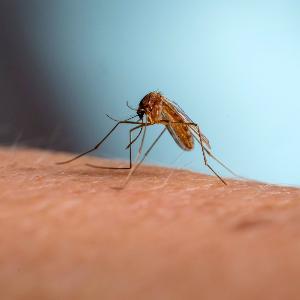
© IMAGO / MiS
- A research team led by Markus Meißner (LMU Munich) and Gernot Längst (University of Regensburg) has gained important insights into the gene regulation of the malaria pathogen.
- The results supply the foundation for novel active agents against malaria, which could increase the effectiveness of existing drugs and prevent the development of resistant parasites.
Malaria remains one of the greatest global health threats. In 2022, there were an estimated 247 million infections and over 600,000 deaths, mostly in sub-Saharan Africa. Innovative research approaches are therefore urgently needed to achieve long-term progress in prevention and treatment.
Malaria is caused by parasites of the genus Plasmodium, which is transmitted to humans through the bite of infected mosquitoes. Plasmodium falciparum, the deadliest of the malaria species, has a highly complex life cycle controlled by precise gene regulation. Understanding these regulatory processes is crucial in order to specifically combat the pathogen at different stages of development.
The team identified the chromatin remodeler PfSnf2L (a protein complex that regulates the accessibility of DNA for transcription) as a key regulator of genes that play an important role in various stages of the pathogen's development. "Our research shows that PfSnf2L is essential for P. falciparum to dynamically adjust gene expression," explains Maria Theresia Watzlowik, lead author of the study.
"The unique sequence and functional properties of PfSnf2L led to the identification of a highly specific inhibitor that only kills Plasmodium falciparum," explains Gernot Längst, Professor of Biochemistry at the University of Regensburg. "This inhibitor represents a new class of antimalarials, potentially targeting all life cycle stages," adds Professor Markus Meißner, Chair Professor of Experimental Parasitology at LMU's Faculty of Veterinary Medicine.
"Malaria is one of the most adaptive diseases we face," observes Längst. Targeting its epigenetic regulation could pave the way for increasing the effectiveness of existing drugs, for example, or preventing the development of resistant parasites.
"The study underscores the importance of integrating epigenetics into malaria research. Future work will focus on testing small molecules that inhibit the parasite's epigenetic machinery and exploring their effectiveness in preclinical models," concludes Meißner.
In addition to scientists from LMU and the University of Regensburg, researchers from the University of Zurich (Switzerland), Pennsylvania State University (United States), and the University of Glasgow (United Kingdom) were involved in the study, which was supported by the German Research Foundation (DFG).
Publication:
Maria Theresia Watzlowik et al.:
Plasmodium blood stage development requires the chromatin remodeller Snf2L.
Nature 2025
DOI: 10.1038/s41586-025-08595-x






